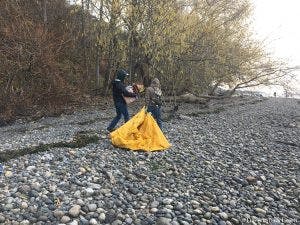By Emily Mueller
Locust Beach went from being lined with trash to being lined with volunteers during an event organized by WWU Students for the Salish Sea.
Roughly 30 people gathered in an effort to clean the shoreline and make a difference in the community.
The Saturday, Nov. 18 beach cleanup was used as a way to spread awareness for a petition co-founded by the Salish Sea Institute and Protectors of the Salish Sea. It would make the sea a whale sanctuary and prevent the expansion of fossil fuel projects, said senior Lydia Dennee-Lee, a co-facilitator for WWU Students for the Salish Sea.
The petition is called the Tokitae Proclamation. It is named for Tokitae, also known as Lolita, a whale who was taken from the waters and sold to an aquarium in Florida, according to the Salish Sea Marine Sanctuary website.
The hope is that Tokitae could be returned to her traditional waters with resident L-Pod orca whales. This could set a precedent for behavior in whale sanctuaries, Dennee-Lee said.
[metaslider id=20031]
Students for the Salish Sea began at Western as a pilot organization last year. There are several other active chapters along the coast of the Salish Sea, including one at the University of Washington and at the University of British Columbia, said senior Jane Werner, a co-facilitator of the organization.
“We’re a club who tries to activate and educate college students on how to be advocates for indigenous solidarity movements, while also protecting and raising awareness about the state of the Salish Sea and how it’s at risk of different threats to different oil industries and how it’s being exploited by them,” Werner said.
Junior Clare Casey is an artist for the club.
She donates 15 to 20 percent of profits from selling her artwork to Students for the Salish Sea.
“It’s so much more powerful to walk on the beach, especially in our town, and see that it’s clean and there aren’t pieces of trash, that everything is natural,” Casey said.
As participants arrived, co-facilitators talked about positive impacts the beach cleanup would have. They acknowledged they were on Lummi and Nooksack territory, which the club considers an important part of showing their support to indigenous communities, Dennee-Lee said.
“I think a huge part of it is just to get kids involved, to not only get their hands on physically helping the ecosystem, but also being able to witness it and see it and come together as a community, because I think we’re stronger in numbers,” Casey said.






